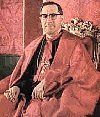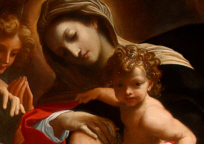In one of his writings, Prince Scortesco, German cousin of Prince Borghese, President of the Conclave which elected Montini to the Supreme Pontificate, gives the following information concerning the Conclave of 21 June 1963: “During the Conclave, a Cardinal left the Sistine Chapel, met with the representatives of B’nai - B’rith, announced to them the election of Cardinal Siri. They replied by saying that the persecutions against the Church would continue at once. Returning to the Conclave, he made Montini to be elected.”
When paying a visit to Monsieur de la Franquerie, in November 1984, with my friend François Dallais, we spoke again of this grave problem. Monsieur de La Franquerie, in 1963, was in permanent contact with numerous Roman prelates, and he confirmed to us that he had heard of this confidentially by persons who could be trusted to be well aware of these facts.
We decided, in order to relieve our conscience, to see Cardinal Siri in Genoa. As Monsieur de la Franquerie has had the opportunity of seeing him in the past and having had pleasant conversations with him, he wrote to him in order to ask for an audience; which the Cardinal granted to us on Friday following Ascension, 1985.
In this way on 17 May 1985, we met together at my home in Lyon, Monsieur de la Franquerie, and François Dallais. The evening was marvelous. I admit that I am sensitive to the charm of the very old France of our dear Marquis, and we occupied, until a very advanced hour of the night, unforgettable moments by listening to his souvenirs of a fecund and well-filled life. In his souvenirs of Monseigneur [Paul] Jouin, the Marechal Petain or of Pius XII, Monsieur de la Franquerie is unquenchable and passionate.
The following day we left early to Genoa where the Cardinal was expecting us towards ten hours and granted us an audience of two hours. We were received with much attention in the wonderful episcopal palace of Genoa. The Cardinal speaks French very well, was cordial, attentive, and of a courtesy proper to people, who are great by their function, but still greater by their heart. A dialogue took place between these two respectable persons in a diplomatic language which I did not know and which is of a charm and delicacy resulting from the education of hundreds of years, and unfortunately no longer exists today.
They spoke of several problems of today and the past, which need not be recalled here. Of concern to us, as arranged the evening before, was to speak, first of all, about Cardinal Tisserant’s leaving the conclave. When we recalled this fact, the reaction of Cardinal Siri was clear, precise, firm, and unquestionable: “No, no one has left the Conclave.” He could only give witness of what he had seen and not of what might have happened, while he was asleep, or behind his back. But what retained our attention was this firmness, this categorical NO of the Cardinal.
Some moments later, when we asked him whether he had been elected pope, his reaction was completely different. He started by remaining silent for a long time, then raised his eyes to heaven with a rictus of suffering and pain, joined his hands and said, weighing each word with gravity: “I am bound by the secret.” Then, after a long silence, heavy for us all, he said again: “I am bound by the secret. This secret is horrible. I would have books to write about the different conclaves. Very serious things have taken place. But I can say nothing.”
Let’s think about it. If he had not been elected pope, he would have said so with as much promptness and firmness as he had replied to the preceding question. As he had been elected, he could not say so, as he was bound by the secret, and as he could not lie, he took refuge behind this secret.
In fact, it appears that someone among my trustworthy friends who knows him very well has assured me that the Cardinal had told him that he had been elected pope twice: instead of *Paul VI and instead of *Wojtyla. The first time he had refused, the second time he had been obliged to refuse under the pressure of schism!
We were three witnesses who have left very perturbed and practically convinced of his election.
And now there are serious questions being raised. Has he resigned? Has he been forced to resign? What about these elections? What heavy secrets are weighing upon him?
During the last Synod, he remained some hours and then left. In spite of his advanced age and the fact that he exceeded 75 years, he has not given his resignation and he has not been asked to do so [as of this publication in July 1986].
What now? The last Cardinal nominated by Pius XII, we leave to the historians and theologians the care to study this question thoroughly and to reply to it. We simply leave this grave witness.
The article above, written in 1986 before Siri's death in 1989, could open new investigations.
*Note: "Paul VI" and Wojtyla were both incontrovertibly anti-popes. -The Webmaster 2005 A.D.

